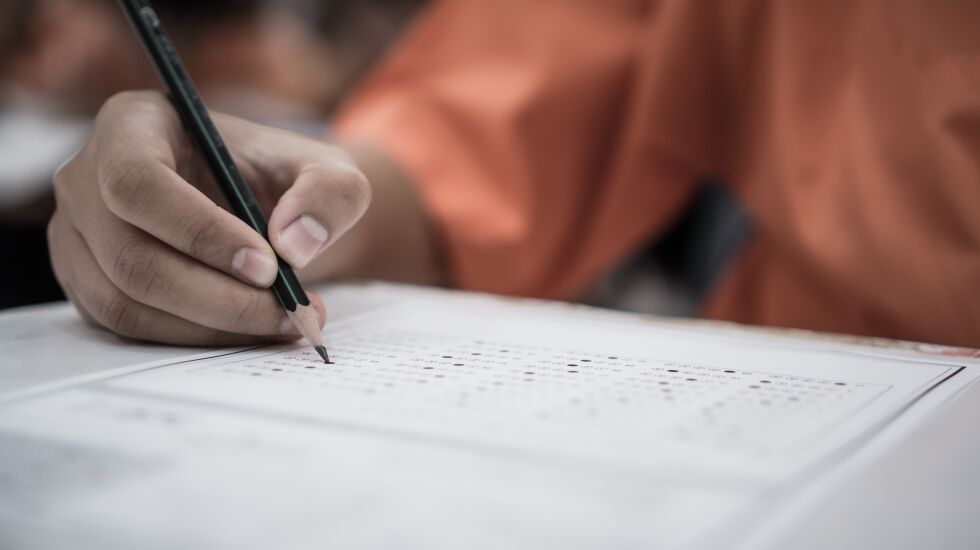
March brings spring across the United States, and in the sporting world, the chirp of a whistle and the toss of an orange-and-black basketball signals the beginning of the NCAA tournaments.
At the same time, our nation’s classrooms — usually filled with the sound of students and teachers engaged in lively discussions — have fallen silent. Our students are engaged in their own high-stakes game, but as time ticks away at the clock, they’re not aiming to score in the hoop. Instead, they are pencilling in by hand, or clicking away on their computers, to answer multiple-choice questions on standardized exams.
March brings with it madness on the basketball court. But March and April also bring unwanted disruption to our students’ learning, with the madness of high-stakes testing season.
For children in Illinois — including mine, who are in elementary school — there is the Illinois Assessment of Readiness, or the IAR. Soon, many elementary and middle school students will take the Measures of Academic Progress, or MAP exam, as well. High school students, like those I teach, will begin their exams in April, taking the SAT test. Some will continue testing with the Advanced Placement, or AP, exams in May.
Many highly selective colleges in our state, including the University of Chicago and Northwestern University, are among the 1,800 institutions across the nation that are now test-optional. But our elementary and secondary schools continue to behave as though these standardized tests are an accurate reflection of real learning and deep understanding.
Instead, these tests show only that students have reached a certain narrow benchmark: correctly answering a series of multiple-choice questions.
As the nation watches the young men’s and women’s college basketball stars dribbling their way to success on the court, I wonder if most people realize that the scene may have looked much different just three years ago.
Before COVID-19, the NCAA used test scores to determine eligibility for incoming freshmen for Division 1 and 2 sports. During the pandemic, the NCAA waived the test requirement. As a result, there’s been a big increase in the number of high school seniors who are eligible to play college sports, according to Joyce Anderson, the College Board student athlete advisor for Evanston Township High School and the cofounder of Honest Game, an organization that helps student athletes and schools determine potential NCAA eligibility.
Even this year, with schools fully reopened and testing once again underway, the NCAA continues to waive testing requirements as part of its long-term plan to promote racial equity.
Institutions have begun to realize that relying heavily on standardized tests is an unfair way to assess students, decide on college admission and collegiate sports eligibility, let’s ask ourselves: Why are we still subjecting our students to the monotony of testing instead of providing them with engaging instruction?
It is interesting to note that the NCAA has linked standardized tests with racial inequity. Many scholars have discussed testing’s racist origins, and “the achievement gap” between white, Black and Latino students has become a household term. Yet the cycle continues, because the end product is a number that appears to quantify something — intelligence, skills, knowledge, achievement, whatever educational leaders and policymakers want that number to mean — that, in reality, cannot be reduced to a single number.
Only our nation’s highest academic institutions — our colleges and universities — aren’t buying the numbers anymore. The University of Chicago’s Consortium on School Research in 2020 made news with its finding that standardized tests didn’t automatically add up to later success for Chicago high school graduates — student GPA’s did, and were much more predictive of college success than ACT scores.
I envision a spring that is filled with the day-to-day chatter of the classroom, with projects, portfolios and the use of teacher-based assessments instead of the silence of test-taking — and daydreaming of a more vibrant school experience.
As a nation, let’s look to our highest institutions as leaders. Let’s phase out the reliance on standardized tests as the way we measure our students’ learning.
Gina Caneva is the library media specialist for East Leyden High School in Franklin Park. She taught in CPS for 15 years and is Nationally Board Certified. Follow her on Twitter @GinaCaneva
Send letters to letters@suntimes.com
The views and opinions expressed by contributors are their own and do not necessarily reflect those of the Chicago Sun-Times or any of its affiliates.







